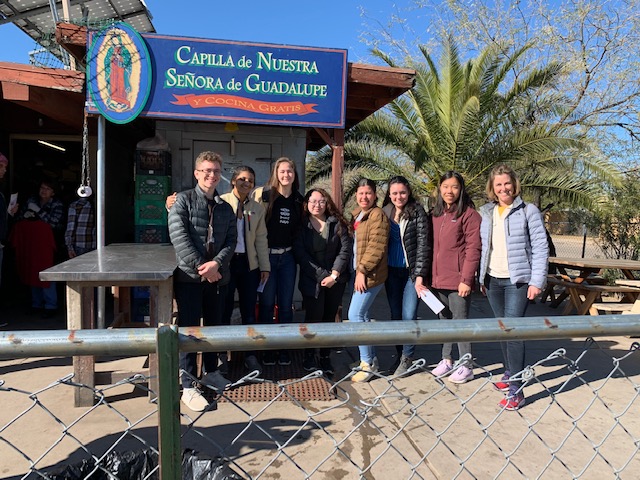
Border Trip: Day 6
Post written by Alyssa Kryzelle Reyes and Vani Kanoria. Colgate Class of 2022.
Nine students and Professor Simpson started the day by helping at Casa Maria, a Catholic soup kitchen that serves the neighborhood of Tucson, Arizona. In addition to feeding about 400 people daily in a small, but efficient space, they provide spiritual support through mass, and empower community members to educate themselves about issues of inequality and injustice. Volunteering at the soup kitchen that morning turned out to be an eye-opening experience for us, helping us understand the realities of inequality in the communities near the border, and the importance of community-based work in bettering the lives of others.
After helping at the soup kitchen, we met Todd Miller, the author of Border Patrol Nation: Dispatches from the Front Lines of Homeland Security. He explained his work as an investigative journalist and how he reports on the rapid growth of militarization to deter migration from the South. He explained how the United States uses the latest technologies to militarize the 2,000-mile long division between the two countries. The border has become a business, he states: the uniforms, the towers, the cameras, the vehicles, and everything else is contracted from private companies. However, the gravity of the rapid weaponization is unknown to many, as is the amount of money poured into fortifying the border. Mr Miller ended the discussion with hopes that with journalistic criticism and pressure on the government, we may slow down this militarization. Overall, from this talk, we learned much about the economic and financial forces influencing border policies.
For our last meeting of the day, we spoke to Lizzy Hannah, who works in a legal capacity for The Florence Immigrant and Refugee Rights Project, an organisation in Arizona that provides free legal representation and social services to detained immigrants under threat of deportation. We asked Lizzy several questions about the process of applying for asylum. She spoke about Operation Streamline, which adopts a “zero-tolerance” approach to illegal entry into the US by criminally prosecuting the offenders. She spoke about how 90% of asylum speakers represent themselves, and are expected to do it in English. It became evident to us from Lizzy’s responses that the current system is designed to grant asylum to only a small percentage of applicants. When asked what changes she would make to the U.S. policy on immigration, Lizzy says that she recommends eliminating private prisons and investing in more social workers. Her organization can represent only so many detainees.
That day, we realized that immigrants are being criminalized through the system of criminal prosecution decreed by the U.S. government, and it is up to journalists like Todd Miller to reveal the intricacies behind the policies and for the public sector to provide humanitarian aid to illegal immigrants until the current policies are changed.